Commusings: The Poetics of Healing with Jacqueline Suskin
Feb 13, 2021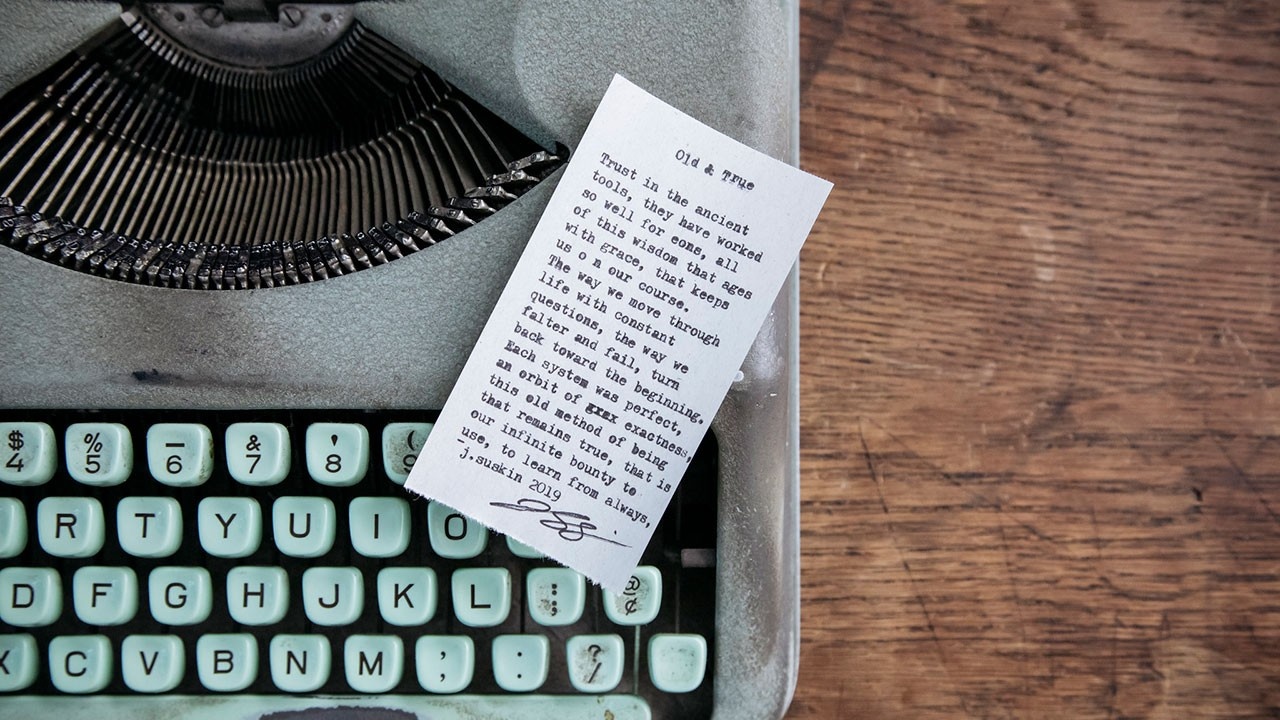
Hello Communicants,
The first week I moved to Los Angeles, I decided to pay a visit to the Hollywood Farmers’ Market. I figured that was a good spot to find my people. My instincts were correct. Sandwiched between Bezian’s sourdough kiosk and a Mediterranean hummus stand was a lithe sprite hunched over an old mechanical typewriter. She jabbed at the keys with aplomb, producing a percussive concerto of clicks.
For a long time I watched a line of men, women, and children approach to receive her extemporaneous poems — some nervous, others just curious. She listened intently and then madly translated scattered emotions into words. These parchment vessels never failed to elicit laughter or a fraught tightening of lips. It was a delight to witness these quiet catharses tucked into a side street of Hollywood.
Finally, I summoned the courage to enter the queue myself. She offered me a beautiful piece of writing then, and now five years later, I am honored to host Jacqueline here for this week’s missive.
If this piece inspires you to try your own hand at poetry, I highly recommend taking her free, 5-day Commune course, Every Day is a Poem.
I’m here for you at [email protected].
~ Jeff
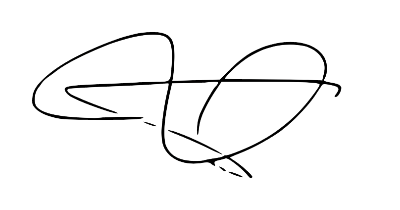
As a poet, I never anticipated playing a role in the health and wellness world. Throughout history poets have worn many cloaks, mystical and political, radical and spiritual, but I never imagined myself surrounded by an aura of self-help.
Yet, in speaking with a fellow poet about this unexpected overlap, he wasn’t surprised. “It’s one of the few places in our society where wisdom is still taken seriously,” he said. “So it makes sense your work would end up there.”
This sparked a much deeper reflection: From what roots does poetry pull its power?
After twelve years making my living as a poet, after writing more than forty thousand spontaneous poems in public, I’ve accepted a truth: poetry is a precise package for delivering healing. And in my thirty-six years on the planet, I’ve never felt a deeper collective need for widespread, soothing counsel. We are asking the biggest questions we can about restructuring society and building new culture. How can we heal our global wounds? How can we shift into a new, shared story?
Poetry helps us assimilate answers to life’s largest inquiries.
The very first time I performed in public with my project Poem Store, a woman approached me and my typewriter with curiosity. We were in downtown Oakland, in the middle of a bustling street fair, and I had no idea what to expect from this writing experiment. My customer looked me right in the eye and said, “I want a poem about heartbreak.” She paused, took a deep breath, and clarified, “not the regular kind of heartbreak, but more like when you look back on your life and you see how many places you didn’t get to live because you couldn’t live everywhere, how many people you didn’t love because you can’t love everyone, how many roads you didn’t travel because you can’t go everywhere, and it’s just heartbreaking.”
My mouth fell open a bit, struck by her openness. I instantly started writing, filled with inspiration. It’s not that I saw something hidden in her eyes, or felt a unique connection to her spirit, it’s that I heard her words, related, and let the muse carry out a conversation between us.
After two minutes, I pulled the strip of newsprint from my typewriter and read her the poem. When I finished, I looked up. She was crying. “Thank you,” she said. “That is exactly what I meant.”
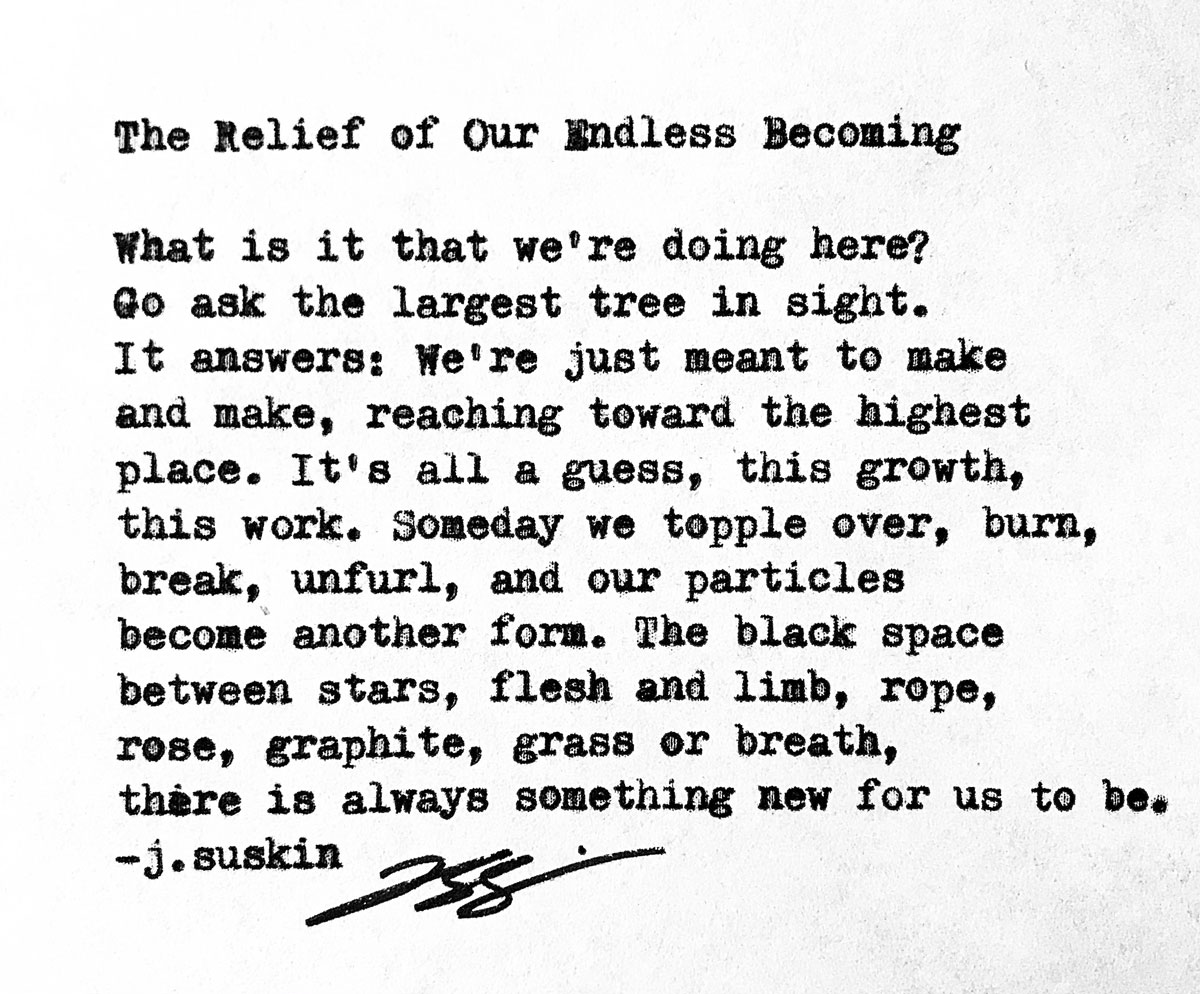
Each customer is seeking a translation of her inner world. A person offers me a subject and I respond with a poem. I read it aloud and they pay whatever they want. It’s a beautiful and mysterious communion, but more than anything, it’s healing.
Reading each ink-fresh poem triggers an eruption of self-knowledge, a shared acknowledgement of human experience, a likeness and connection blooming between me and the person requesting the poem. The translation of their subject matter, this offering of wisdom, holds them as they become wholly seen and known, if just in that brief period of recitation.
Here is the man who has committed adultery and considers his wrongdoing through verse. Here is the grieving mother who lost her son to suicide. Here is the houseless man who wants a poem in praise of his bicycle. Here is the child who has never seen a typewriter before and wants a poem about poetry. Here is confession, reflection, grief, trauma, solace, and awe. To weave this intimate trade is to wield and witness the greater force at work within the world of words.
With each poem, with the sobs and gasps, I see transformation. The fallen husband reads his poem and begins therapy. The mother recites the poem at her son’s funeral. The houseless man smiles at me each time he rides by the Sunday farmers’ market. The child gets a typewriter and shows me his first poem.
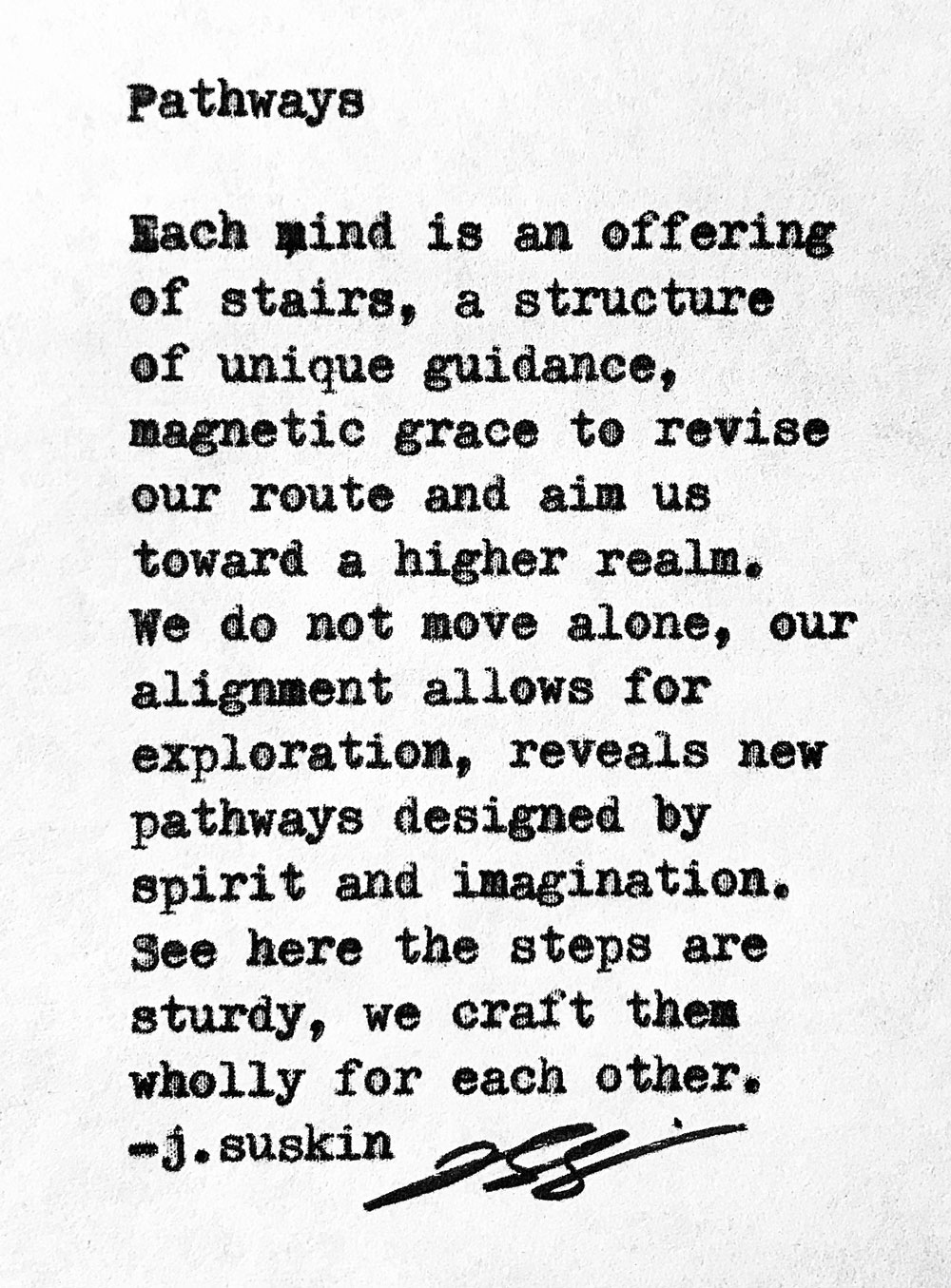
• • •
I come from a culture of hippy-punks, travelers and artists, anarchists and wingnuts from the fringe. In this community we value the homemade craft of wellness and the healing work of dismantling oppression, capitalism, and white supremacy. When I decided to move to Los Angeles, I was excited to infiltrate the Hollywood status quo and sneak poetry into every corner. I saw this as an act of mutual aid, a way to create change from inside the belly of the beast.
What would happen if I scrambled the wavelengths of the screen-obsessed with poetic offerings? Could I translate their depths and reveal the need for great change through beautiful verse?
I wanted to see if I could build a career as a poet following my own rules. I brought my typewriter to fancy parties and celebrity fundraisers. I was an undercover, tattooed ruffian writing for Oprah Winfrey, Drew Barrymore, and the Kardashians.
I remember sitting in a courtyard, surrounded by heaps of roses and ornate hors d'oeuvres, wondering what I was doing in such an over-the-top atmosphere. I wasn’t as much uncomfortable as disapproving. Then, folks started lining up for poems. First, I wrote for a widow who longed to celebrate the life of her recently passed husband. She left my table in tears saying how grateful she was to finally cry. Then I wrote for a skeptical man in a suit who ended up getting a poem about his mother who he’d just placed in a retirement home. He let out a sigh of relief and thanked me. One after the next, the partiers opened up, showed me their wounds, their softness, their humanity. Many expressed how good it felt to have someone hold space for them in such an honest way.
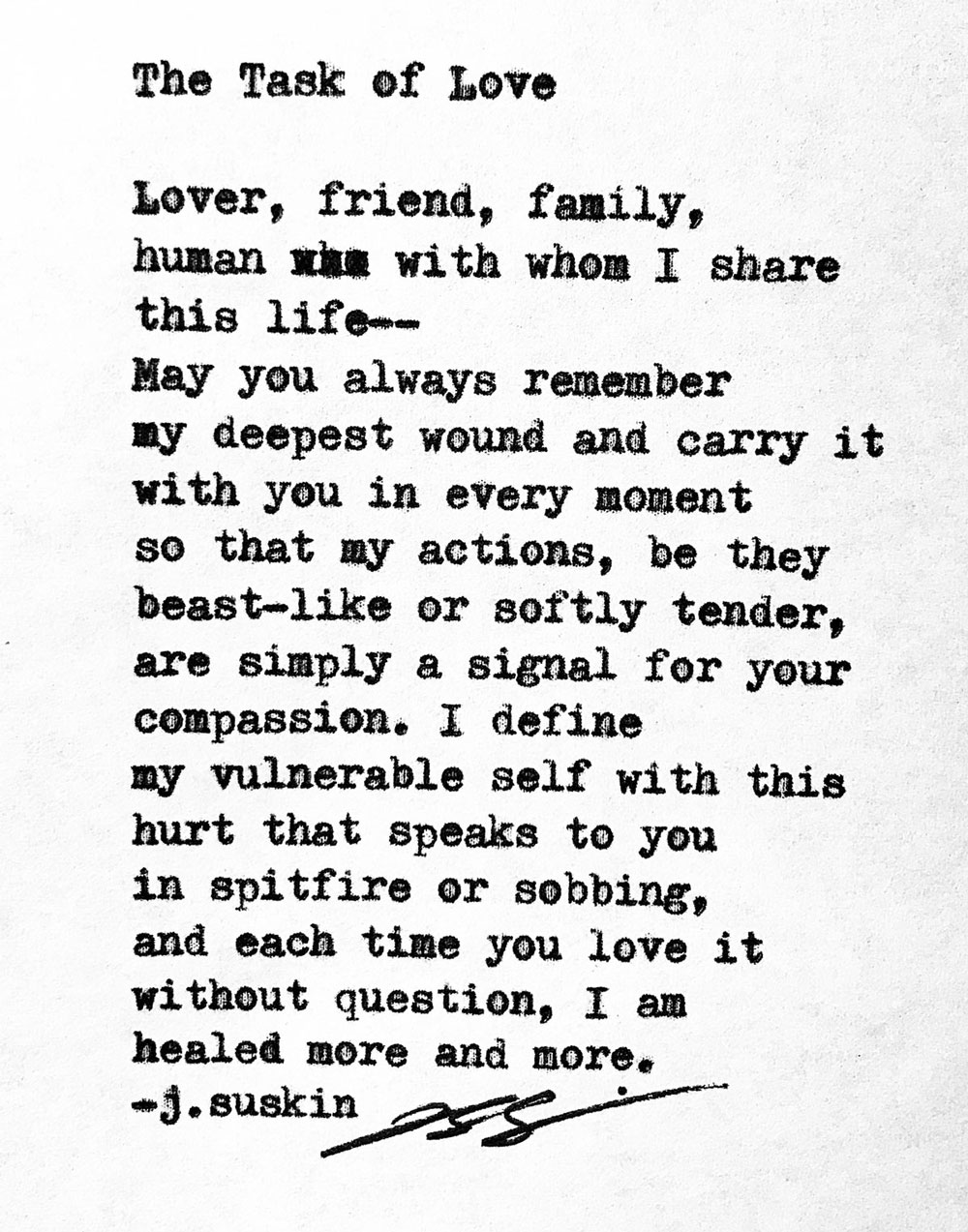
I’ve always believed in the need for healers and guides, and I greatly value the art of creating a safe container for others while they dig through the dark. So many poets and spiritual leaders have ushered me along on my path. When I’m hurting, I turn to the worn pages of my favorite books. I read Mary Oliver when I feel disconnected from the voice of the planet. I read Alice Walker when I forget the power of making meaning where I previously found none.
Without the work of all the artists who move me, I would not be able to place myself in these unlikely settings, fully available to hold space for people at their most raw and vulnerable. By being present and writing at parties or farmers’ markets, I was making room for a different story. I was allowing myself to be a vessel for connection in places where connection was lacking. This is how I began to accept the idea of being both a healer and a poet.
To be someone who has suffered trauma, to be a highly empathic woman sitting in public space for years, translating the woes of the community, to feel the pain of the world in every interaction and still fully adore my experience, puts me in a unique position to not only teach the craft of poetry, but also to show others how to rejoice in the darkness and the light.
That’s my work as a poet: to celebrate the intensity of being alive, to illuminate the beauty in the gross tangle of it all.
I share the how and why of it, which I uncover as I sit below a giant redwood, as I watch the news, as I research history and learn from other visionaries. If this aligns me with the wellness industry, so be it. As long as my words are of service, spreading inspiration and instigating self-reflection, I can’t and won’t complain.
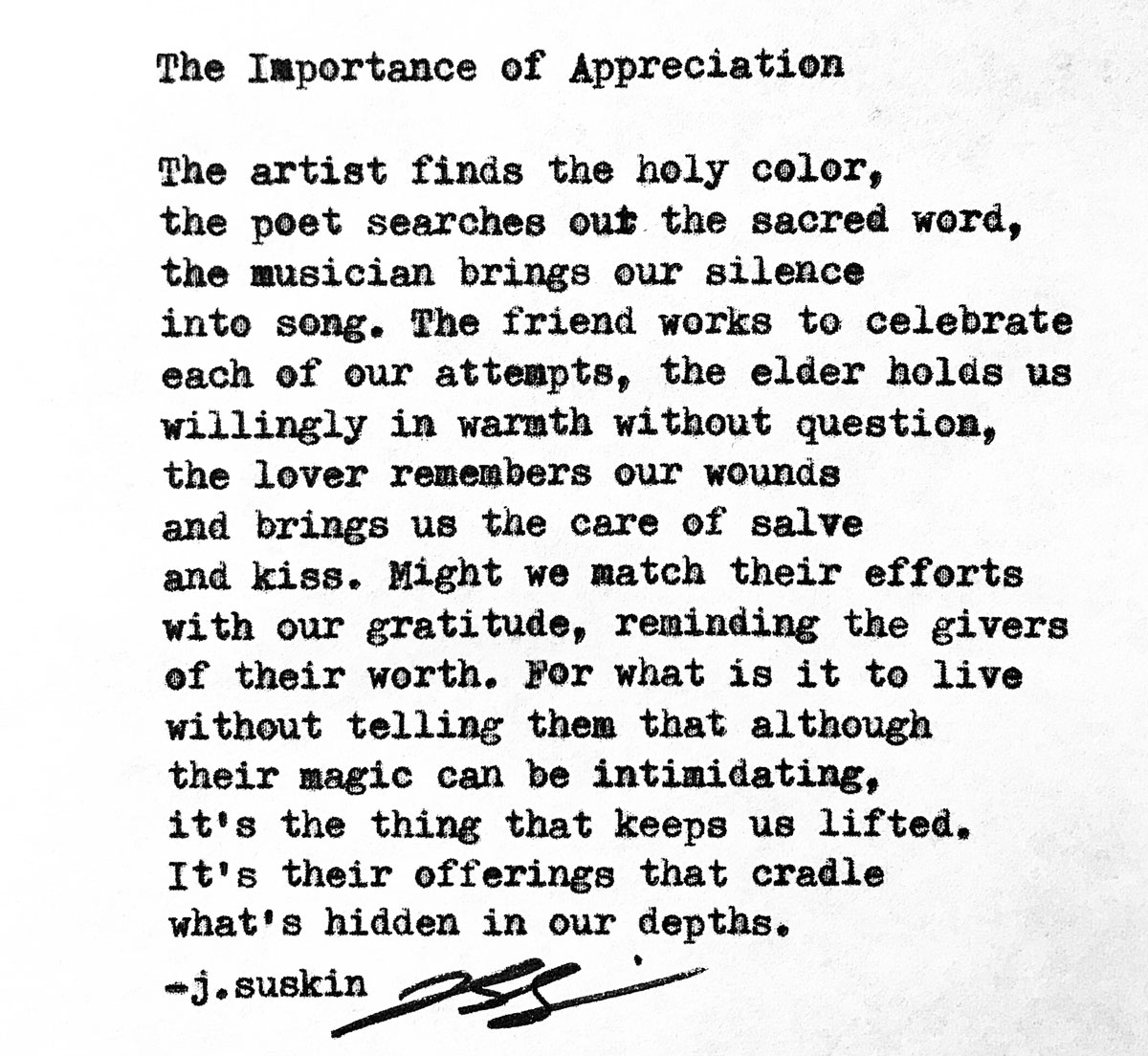
Through the exchange of poetry, people are accepted. They are accepted by me, but more importantly, they are accepted by themselves. I play an integral role in the translation, but I’m more of a mirror than anything else.
When I write a poem for the man who feels lost after being fired, the hope that rises in his eyes comes from the affirmation I provide. In the words I offer him, inspired by his subject matter, he now sees himself as newly capable, wholly human, and willing to change. I don’t keep copies of these poems or take photos of them too often. What ends up on the page is the customer’s creation as much or more so than mine.

• • •
After over a decade of this one-on-one therapeutic exchange, I had a moment of creative transformation. I saw that what happens on the page, that special bloom between writer and reader, between me and my customers when I write in public, is something people can also give to themselves. I’ve watched my words make people weep again and again, but I’m now at the point where I feel a duty to transfer that power of release.
The work of healing and wellness is based in methodology – toolkits ancient and new – and it’s not meant to reside in the hands of one, but of many. It’s the same for the transformative relevance of poetry.
I want people to write their own poems.
Poetry is a precise offering of reflection, it packs the macro into the micro, perfect for our short attention spans, great at getting the point across in as few words as possible. We need this right now, the depths explained quickly, the heart of the matter expressed without excess fluff or distracting overindulgence. We need open communication, shared truth, and accessible affirmation. Poetry presents all of this. It inspires vulnerability, asking the reader to join a universal conversation.
Beyond these moments with my typewriter, beyond the strip of paper customers take home to read, is the full potential for each person to access her own voice, her own sense of self-understanding, and this is where the healing continues.
When I teach classes and help my students uncover their poetic ability, I see them take on the act of creation and establish a belief in their own ability. Suddenly, they don’t need me to write the poem for them. With their newfound skills and practice, they can access this conversation on their own.
And while I can usher folks into the practice of poetry with lessons and guidance, ultimately it’s their own experience of the verse that brings clarity and relief. For example, my mom used to get hung up on understanding my poems. I told her, it’s less about what it means to me and more about what she gets from it. I told her to ask herself these questions:
Which lines speak to me?
Which words illicit a memory?
Which part of the poem inspires me to think or feel differently?
As soon as she let go of her grasp on my voice and started leaning into her own, she began to feel her way through the words, giving herself permission to enjoy poetry and learn from it.
That’s why I think it’s important for me to unfold poetry into a pathway everyone can walk. This is not about striving to be a great writer, but rather honing your ability to self-reflect — and in this community that’s what most people are showing up to do.
It’s up to each of you to create what you will from whatever bits and pieces of inspiration you can uncover in your life.
I find a freedom in that, a choice and a home that honors the deepest potential of poetry.
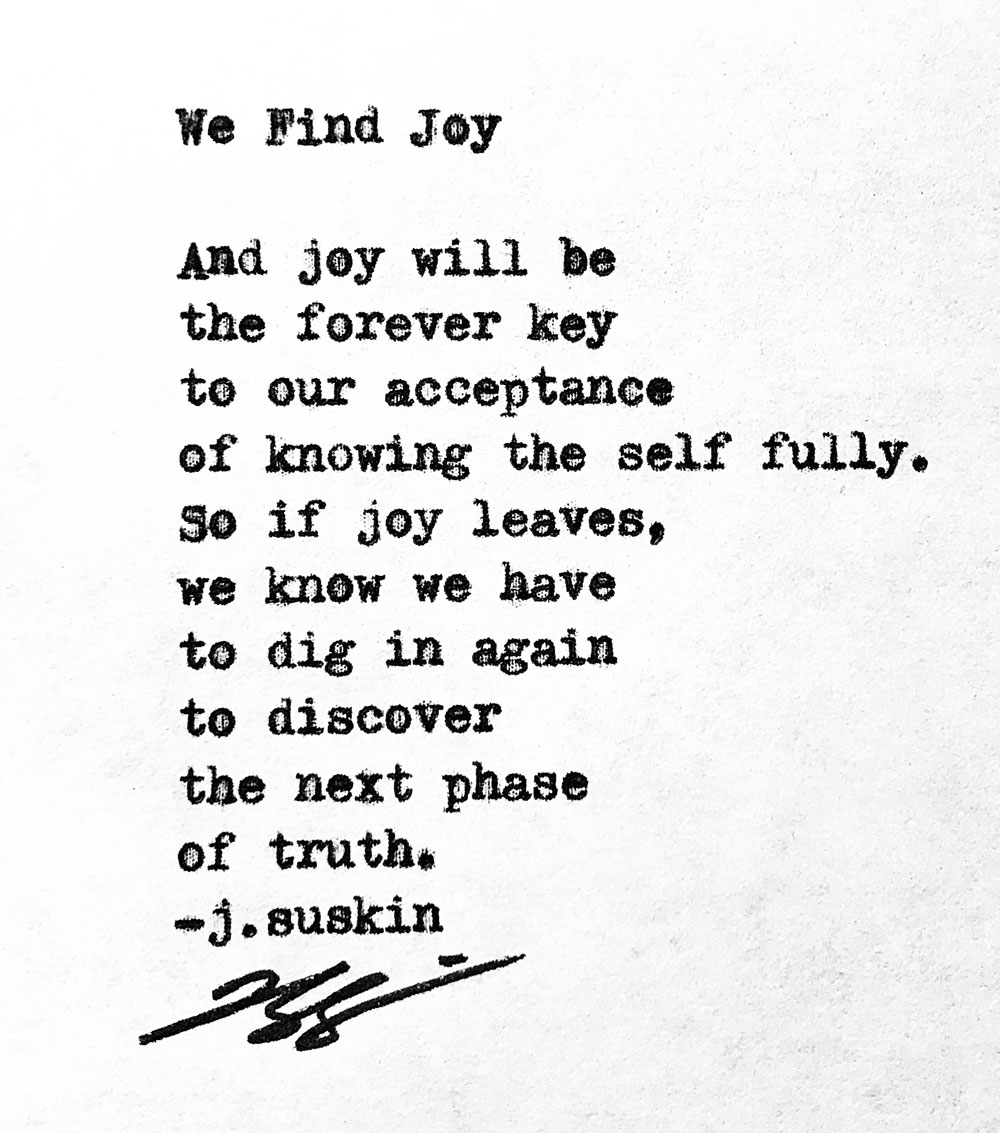
• • •
Jacqueline Suskin is a performance poet and educator who has been teaching workshops, writing books, and creating spontaneous poetry around the world since 2009. With her project, the Poem Store, Suskin has composed more than forty thousand improvisational poems for patrons who chose a topic in exchange for a unique verse. Her work has been featured in New York Times, T Magazine, Los Angeles Times, The Atlantic, and other publications. Her latest book is Every Day Is Poem.
Leading teachers, life-changing courses...
Your path to a happier, healthier life
Get access to our library of over 100 courses on health and nutrition, spirituality, creativity, breathwork and meditation, relationships, personal growth, sustainability, social impact and leadership.
Stay connected with Commune
Receive our weekly Commusings newsletter + free course announcements!


